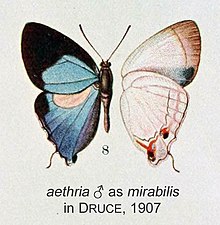델타1 리래
Delta1 Lyrae| 관측 데이터 Epoch J2000.0 이쿼녹스 J2000.0 | |
|---|---|
| 별자리 | 리라 |
| 우측 상승 | 18h 53m 43.55924s[1] |
| 탈위임 | +36° 58′ 18.1891″[1] |
| 겉보기 크기 (V) | 5.56[2] |
| 특성. | |
| 스펙트럼형 | B2.5V[3][4] |
| U-B색지수 | −0.67[2] |
| B-V색지수 | −0.15[2] |
| 아스트로메트리 | |
| 방사 속도 (Rv) | -25.8km[5]/s |
| 고유 운동 (μ) | RA: +1.350[1]mas/yr Dec.: −2.985[1]mas/yr |
| 시차 (π) | 2.8072 ± 0.134[1] 마스 |
| 거리 | 1,160 ± 60 리 (360 ± 20 pc) |
| 절대치수 (MV) | −1.55[6] |
| 궤도[7] | |
| 기간 (P) | 88.352일 |
| 반주축 (a) | ≥46.8gm(0.313AU) |
| 편심성 (e) | 0.37±0.03 |
| 페리아스트론 신기원을 이루다 (T) | 2428406.613±0.500 JD |
| 페리아스트론의 인수 (ω) (2차) | 191.3±0.1° |
| 반암도 (K1) (iii) | 39.7±1.8km/s |
| 세부 사항 | |
| Δ1 Lyr A | |
| 미사 | 7.9±0.1 M☉[4] 7.75±0.50M☉[8] 6.6+0.68 −0.61[9] M☉ |
| 루미도 | 838[6] L☉ |
| 루미도(골수계) | 3,620[8] L☉ |
| 표면 중력 (log g) | 3.764±0.032(3.848 극지)[10] cgs |
| 온도 | 20,350[8] K |
| 금속성 [Fe/H] | -0.05[6] 덱스 |
| 회전 속도 (v sin i) | 86±10km[10]/s |
| 나이 | 21.1±2.2Myr[4] 9+9 −4[9]마이어 |
| 기타 지정 | |
| 데이터베이스 참조 | |
| 심바드 | 자료 |
Δ1 Lyrae에서 라틴어로 표기된 이름인 델타1 리래(Delta Lyrae)는 리라(Lyra) 북쪽 별자리에 있는 이진성계다.야간에는 육안으로 희미하게 볼 수 있으며, 외관상 규모 5.56이다.[2]이 시스템은 시차(parallax)를 기준으로 태양으로부터 약 1,160광년 거리에 위치하지만 방사상 속도 -26 km/s로 더 가까이 표류하고 있다.[1][5]O. J. 에겐은 원래 이것을 델타 리래 군집의 후보 멤버로 포함시켰다.[12]
이 별의 가변 방사 속도는 1904년 예르크스 천문대에서 찍은 사진 판에서 발견되었다.[13]첫 번째 궤도 원소 세트는 1916년 프랭크 크레이그 조던에 의해 계산되었다.[14]궤도 주기가 88.4일이고 편심(오발성)이 0.37인 단일선 분광형 이항이다.[7]
쌍의 가시성 성분은 B2.5V의 별구분을 가진 청백색 빛깔로,[3][4] 수소핵융합이 진행 중인 B형 주계열성임을 알 수 있다.비교적 회전율이 높고 태양 질량의 7~8배 정도 되는 수천만년 된 것이다.이 별은 20,350 K의 유효 온도에서 태양의 광도보다 약 3,620배나[8] 높은 광도를 발산하고 있다.[8]
2012년 현재 위치 각도 20°를 따라 175.30 아크초의 각도 분리 시 진도 9.93의 시각적 동반자가 있다.이 성분은 윌리엄 허셜에 의해 발견되었다.[15]K2급의 진화된 거성별이다.약 1,760광년의 거리에서 III.[16]
참조
- ^ a b c d e f Brown, A. G. A.; et al. (Gaia collaboration) (August 2018). "Gaia Data Release 2: Summary of the contents and survey properties". Astronomy & Astrophysics. 616. A1. arXiv:1804.09365. Bibcode:2018A&A...616A...1G. doi:10.1051/0004-6361/201833051.이 소스에 대한 가이아 DR2 기록 VizieR.
- ^ a b c d Guetter, H. H. (October 1974), "UBV photometry of 180 early-type stars", Publications of the Astronomical Society of the Pacific, 86: 795–797, Bibcode:1974PASP...86..795G, doi:10.1086/129675.
- ^ a b Guetter, Harry H. (April 1968), "Spectral classification of 239 early-type stars", Publications of the Astronomical Society of the Pacific, 80 (473): 197, Bibcode:1968PASP...80..197G, doi:10.1086/128611.
- ^ a b c d Tetzlaff, N.; et al. (January 2011), "A catalogue of young runaway Hipparcos stars within 3 kpc from the Sun", Monthly Notices of the Royal Astronomical Society, 410 (1): 190–200, arXiv:1007.4883, Bibcode:2011MNRAS.410..190T, doi:10.1111/j.1365-2966.2010.17434.x, S2CID 118629873.
- ^ a b Wilson, Ralph Elmer (1953), "General catalogue of stellar radial velocities", Carnegie Institute Washington D.C. Publication, Carnegie Institution of Washington, Bibcode:1953GCRV..C......0W.
- ^ a b c Anderson, E.; Francis, Ch. (2012), "XHIP: An extended hipparcos compilation", Astronomy Letters, 38 (5): 331, arXiv:1108.4971, Bibcode:2012AstL...38..331A, doi:10.1134/S1063773712050015, S2CID 119257644.
- ^ a b Richardson, E. H.; McKellar, A. (1957), "Redetermination of the spectrographic orbit of delta1 Lyrae", Publ. Dominion Astrophys. Obs., 10: 407–413, Bibcode:1958PDAO...10..407R. , 412 페이지
- ^ a b c d e Hohle, M. M.; et al. (April 2010), "Masses and luminosities of O- and B-type stars and red supergiants", Astronomische Nachrichten, 331 (4): 349, arXiv:1003.2335, Bibcode:2010AN....331..349H, doi:10.1002/asna.200911355, S2CID 111387483.
- ^ a b Gullikson, Kevin; et al. (July 26, 2016), "The Close Companion Mass-ratio Distribution of Intermediate-mass Stars", The Astronomical Journal, 152 (2): 40–53, arXiv:1604.06456, Bibcode:2016AJ....152...40G, doi:10.3847/0004-6256/152/2/40, S2CID 119179065.
- ^ a b Huang, W.; Gies, D. R. (August 2008), "Stellar Rotation in Field and Cluster B Stars", The Astrophysical Journal, 683 (2): 1045–1051, arXiv:0805.2133, Bibcode:2008ApJ...683.1045H, doi:10.1086/590106, S2CID 18926523.
- ^ "del01 Lyr". SIMBAD. Centre de données astronomiques de Strasbourg. Retrieved 2021-01-23.
{{cite web}}: CS1 maint : 포스트스크립트(링크) - ^ Eggen, O. J. (July 1983), "Concentrations in the Local Association- II. The northern concentrations including the alf Per, Pleiades, M 34 and del LYR clusters.", Monthly Notices of the Royal Astronomical Society, 204: 391–403, Bibcode:1983MNRAS.204..391E, doi:10.1093/mnras/204.2.391.
- ^ Frost, E. B.; Adams, W. S. (1904), "Observations with the Bruce spectrograph", The Astrophysical Journal, 19: 352, Bibcode:1904ApJ....19..350F, doi:10.1086/141124.
- ^ Jordan, Frank Craig (1916), "The orbit of [delta]1 Lyrae", Publications of the Allegheny Observatory of the University of Pittsburgh, 3 (14): 119–124, Bibcode:1916PAllO...3..119J.
- ^ Mason, B. D.; et al. (2014), "The Washington Visual Double Star Catalog", The Astronomical Journal, 122 (6): 3466–3471, Bibcode:2001AJ....122.3466M, doi:10.1086/323920.
- ^ "BD+36 3308". SIMBAD. Centre de données astronomiques de Strasbourg. Retrieved 2021-01-23.
{{cite web}}: CS1 maint : 포스트스크립트(링크)


